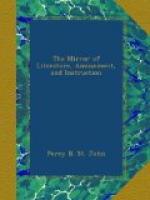* * * * *
THE DREAM GIRL.
There is a certain valley in Languedoc, at no great distance from the palace of the Bishop of Mendes, where to this day the traveller is struck by some singular diversities of scenery. The valley itself is the most quiet and delightful that France can boast. A stream wanders through it, with just rapidity enough to keep its waters sweet and clear; and, on either side of this line of beauty, some gently swelling meadows extend—on one side to a chain of smooth green hills, and on the other, to the base of a mountain of almost inaccessible rocks. The river is bordered by willows and other shrubs, crowding to dip their branches in the transparent wave; and here and there in its neighbourhood, groves of walnut-trees stud the meadows, serving as a rendezvous of amusement for innumerable nightingales, which at the first dawn of summer assemble on the branches, and, as if in mockery of the poets, fill the evening air with their mirthful music.
The village of Rossignol (so named, probably, on account of the abundance of nightingales in the neighbourhood) was inhabited by very poor, but very happy people. It is true that, in common with other cultivators of the fickle earth, they had sometimes to mourn the overthrow of the husbandman’s hopes; and that even their remote and lonely situation did not always protect them from the exactions of those whom birth, violence, or accident had made the lords of the domain. But in such cases, the villagers of Rossignol had a resource, limited, indeed, and attended by hardship, and even danger, but, to a certain extent, absolutely unfailing.
It must not be supposed, however, that, even in an Arcadia like this,
“The course of true love always did run smooth.”
There was one young girl, called Julie, who was cruel enough to have depopulated a whole nation of lovers. She was the most beautiful creature, it is said, that ever skimmed the surface of this breathing world. Her light brown hair was illumined in the bends of the curls with gleams resembling those of auburn, and it was so long and luxuriant, that when, in the ardour of the chase, it became unbound, and floated in clouds around her, that seemed just touched on their golden summits by the sun, she looked more like a thing of air than of earth.
Nor was the illusion dissipated when, flinging away with her white arm the redundant tresses, her face flashed upon the gazer. There was nothing in it of that tinge of earth—for there is no word for the thought—which identifies the loveliest and happiest faces with mortality. There was no shade of care upon her dazzling brow—no touch of tender thought upon her lip—no flash, even of hope, in her radiant eyes. Her expression spoke neither of the past nor the future—neither of graves nor altars. She was a thing of mere physical life—a gay and glorious creature of the sun, and the wind, and the dews; who exchanged as carelessly and unconsciously as a flower, the sweet smell of her beauty for the bounties of nature, and pierced the ear of heaven with her mirthful songs, from nothing higher than the instinct of a bird.




